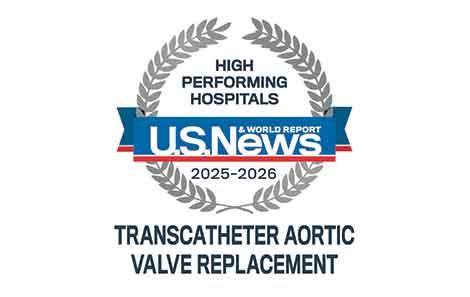TAVR: Transcatheter Aortic Valve Replacement & Sapien Valve
Make an Appointment
Does your heart feel "off" sometimes? Are you getting tired and out of breath when exercising? Aortic stenosis can make you worried that you're headed for a serious heart problem. The heart experts at UVA Health can help.
We can treat aortic stenosis by replacing your aortic valve. In the past, that meant open surgery. But with transcatheter aortic valve replacement (TAVR), you can avoid open surgery. You won't need the large cut and long recovery that's needed with open surgery. TAVR only uses a small cut. Through that cut, we can fix your aortic valve with a new valve, called the Sapien valve.
Transcatheter Aortic Valve Replacement at UVA Health
Aortic valve replacement with TAVR means you aren't having open surgery. Instead, we use a small tube called a catheter (it's a minimally invasive procedure). Through the catheter, we can send the Sapien valve up to your heart and put it in place.

High-Performing In TAVR
5 of our heart, vein, and artery treatments received the highest possible rating from U.S. News & World Report, including TAVR and aortic valve surgery (ranked as "high performing").
How Does the TAVR Procedure Work?
To start, you'll get medicine to make you fall asleep. Then we put a wand-like tool in your mouth and down your throat to your stomach. It lets us see your heart and aortic valve while we work on it. This is called a transesophageal echocardiogram.
We make a small cut on a blood vessel in either your leg or your ribs to put in the catheter. The Sapien valve is attached to a balloon at the end of the catheter. We then send the catheter with the valve on it through your blood vessels to your heart (called cardiac catheterization).
When the Sapien valve gets to your aortic valve, we inflate the balloon. That expands the valve into position. It also moves the diseased valve out of the way. The new valve works the same as the old valve. It opens and closes like a 1-way door, only letting blood flow in the right direction.
Who Qualifies for TAVR?
If you're at high risk for having surgery complications and have serious aortic stenosis, you might be eligible for TAVR. TAVR helps people who are too sick for regular surgery get the help they need.
You aren't a good candidate for TAVR if you:
- Have mostly just aortic valve leakage or regurgitation (blood flows backward through the valve), not stenosis (narrowed valve)
- Have an infection
- Recently had a heart attack or stroke